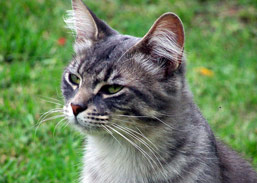Feline Immunodeficiency Virus (FIV) is a virus found around the world that is passed by cat-to-cat contact through blood and nursing. Fortunately, FIV is not terribly contagious and is rarely spread through casual (not aggressive) contact. Cats that go outdoors are at the highest risk of contracting FIV because cats tend to scuffle and the disease is commonly passed by a bite from an infected cat. If a cat does get FIV it does not usually show symptoms for many years. As the disease progresses it suppresses the immune system and cats easily contract secondary infections. Symptoms include lusterless coat condition, enlarged lymph nodes, persistent infections and gradual weight loss. Your vet can test for FIV using a simple in-house blood test. It is good practice to test all new cats before introducing them to your household if you already have other cats. FIV positive cats can live happily for many years when provided with a good diet and they are protected from secondary infections.
Talk to your vet about vaccinating your cats if they go outdoors or often come in contact with other cats. If you do have a FIV positive cat, you should keep it housed separately from healthy cats unless they get along really well there is no concern of fighting or bites. Vaccinate all other cats in the household, but fortunately dogs and humans cannot contract the virus.
Studies
Transcriptional profiling of the host cell response to feline immunodeficiency virus infection.
The virus-receptor interaction in the replication of feline immunodeficiency virus (FIV).
Feline immunodeficiency virus latency.


